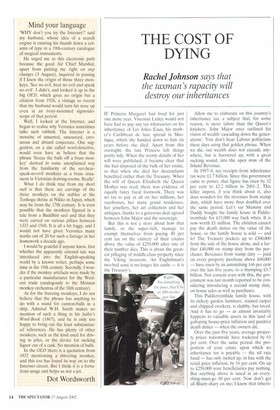Mind your language
'WHY don't you try the Internet?' said my husband, whose idea of a search engine is running his thumb down a column of type in a 19th-century catalogue of surgical instruments.
He urged me to this electronic path because the good Air Chief Marshal, apart from putting me right on step changes (3 August), inquired in passing if I knew the origin of those three monkeys, 'See no evil, hear no evil and speak no evil'. I didn't, and looked it up in the big OED, which gives no origin but a citation from 1926, a vintage so recent that my husband would turn his nose up even at an ivory-mounted sigmoidoscope of that period.
Well, I looked at the Internet, and began to realise why Veronica sometimes talks such rubbish. The Internet is a moraine of unsorted, unsourced, erroneous and absurd conjecture. One suggestion, on a site called word-detective, would even have us believe that the phrase 'freeze the balls off a brass monkey' derived in some unexplained way from the familiarity of the see-hearspeak-no-evil monkeys as a brass ornament in Victorian drawing-rooms. Really!
What I do think true from my short surf is that there are carvings of the three monkeys on the stables at the Toshogu shrine at Nikko in Japan, which may be from the 17th century. It is even possible that the monkeys figured in a tale from a Buddhist sect and that they were carved on various pillars between 1333 and 1568. It is all a bit foggy, and I would not have given Veronica many marks out of 20 for such a farrago in her homework a decade ago.
I would be grateful if anyone knew, first whether the apparently oriental tale was introduced into the English-speaking world by a known writer, perhaps some time in the 19th century. Secondly, I wonder if the monkey artefacts were made by a particular manufacturer for the Western trade (analogously to the Meissen monkey orchestras of the 18th century).
As for the freezing monkeys, I do not believe that the phrase has anything to do with a stand for cannon-balls in a ship. Admiral W.H. Smith makes no mention of such a thing in his Sailor's Word-Book (1867), and he is only too happy to bring out the least substantiated references. He has plenty of other monkeys, such as the kind used for driving in piles, or the device for sucking liquor out of a cask. No mention of balls.
In the OED there is a quotation from 1832 mentioning a shivering monkey, and this too has found its way on to the Internet circuit. But I think it is a fortuitous usage and helps us not a jot.
Dot Wordsworth






























































 Previous page
Previous page